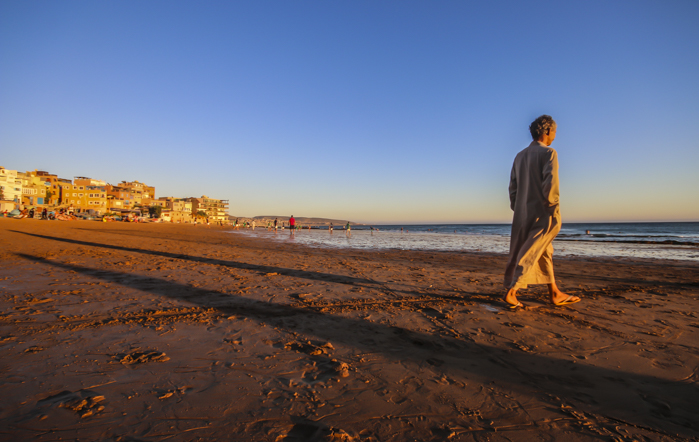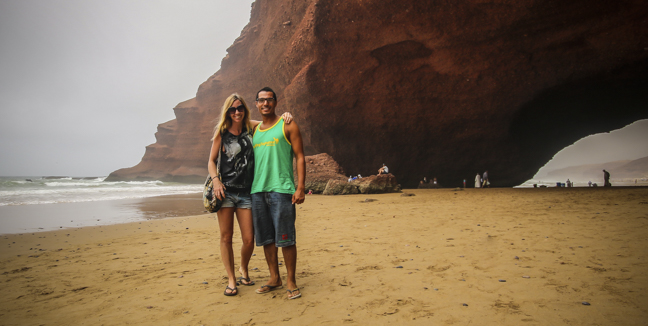Last updated on February 23rd, 2018
I think when I was a little girl growing up in Australia I didn’t visualize my Prince Charming as a Berber man, living in Morocco and of Muslim faith. But despite having grown up on opposite sides of the world, he never having left Morocco and me wandering through more than 80 countries, somehow the universe conspired to bring us together.
While my soon to be husband believes strictly in Islam and the teachings of the Quran and I am what most would probably term an ‘atheist’ with an evolutionary-based scientific background, there is something indefinable but of shared belief that has drawn us together and provided the foundation for a rich and loving relationship.
I came to Morocco on route to somewhere else. I’m not sure where that ‘somewhere else’ was as I travel without fixed plans and, in the end, I never made it there. I arrived in Taghazout by accident – an impulsive diversion from the day’s initial destination inspired by travellers I met along the way. And I met Salah because those travellers, that came to be close friends, went for a surf lesson and decided that their teacher and I we were perfect for one another.
Taghazout is a tiny Berber village that has made its mark as an international surf destination. While it maintains strong traditional roots with men dressed in hooded jellaba coming and going from the mosque throughout the day in response to the ‘Call to prayer’, head-scarf-adorned women enthusiastically absorbed in domestic affairs, and camels ambling lazily along the beaches, it has also embraced the ‘westernized’ culture that thousands of surfers from across Europe and the world have transported to this tiny patch of Morocco. And it is these characteristics that exemplify Salah – a proud Berber man, committed to living by the values of Islam, but openly embracing the different cultures and ideas that come and go through his town with the waves of tourists.
I had travelled through many Muslim countries before but always felt that the beliefs of Islam would be too rigid to be accepting of mine. But Salah approached me with an open mind. Coming from a world where ‘success’ was defined by money, career and accumulated possessions, I was attracted to the simple aspirations of his being. Above all, he wanted to be a good person, as the Quran dictated, and he strove for this in every action. He was not driven by money or ambition or social status. He always spoke with respect and care and acknowledged each person he encountered – whether they are good or bad. His gentle nature, beaming smile and free, inquisitive mind were admirable qualities and inspired me to strive for the same.
We lived together almost immediately without question. In the mornings we surfed, in the afternoons he played beach football while I wrote. We cooked each evening together – him teaching me to construct elaborate tagines over a tiny gas canister, me teaching him the art of cooking al dente pasta. Our routine slowly evolved into what was a simple yet incredibly rich life and the future became about ‘us’ and not ‘me’. We stumbled over small problems and spoke with each other directly and respectfully to find common ground and understanding from what were wildly diverse backgrounds.
There were cultural hurdles to overcome in our days together, such as explaining to extended family that I do not eat meat during the Eid al-Adha ‘Festival of the Sacrifice’ where families are brought together through the slaughter of sheep and its consumption in a myriad of ways over the following days; or being asked to leave our first apartment by a landlord who did not approve of us living there out of wedlock, as Islam dictated. But the Berber expression imik simik (‘step-by-step’) has become a shared expression as both our beliefs are challenged and we make decisions daily based on what is of over-riding importance to us both.
After a few weeks together I met his family and talk of marriage was thrown around without inhibition. ‘If you marry a Moroccan girl I will only buy you a small present,’ one of Salah’s aunties joked. ‘But if you marry this one, it will be big I assure you!’ His mother warmed to me immediately and the idea of marriage (‘Inshallah’), despite our difficulties in communicating as I spoke no Berber. Basic French allowed me to communicate with his two sisters and two brothers who welcomed me without hesitation. But his father was more wary. I was not Moroccan. I was not Muslim.
When Salah asked me to marry him it went unsaid that he needed to get his father’s approval first. Salah asked if I thought I would become Muslim in the future and accepted my explanation that I couldn’t ‘become’ any religion without believing it strongly and whole-heartedly. I was nervous about being judged by his father based not on who I was as a person but my religious beliefs, but his reaction was one of acceptance and understanding for Salah’s choice. His main concern was whether our children would be brought up Muslim or not. We had discussed this in depth – Salah would teach them the values of Islam, but ultimately it would be their choice as to what they wanted to be.
Travel has exposed me to such a diverse range of people, both culturally and religiously, and shattered many preconceptions I may have had about what divides us. A woman living in a mud hut in Ethiopia wants food, shelter, warmth, happiness and safety for her family, just as I do. Almost everything else is superfluous. You may pray to a different God (or no God), but these basic human desires are fundamental to our existence and can traverse cultural boundaries.
As we prepare to marry and delve into paperwork for Salah’s Australian visa I think about the way he will be received in my country. The last weeks have seen a spate of unprovoked attacks against Muslims, and negativity voiced by our Prime Minister regarding the burqha has reinforced the fear many people have about what is a minority and relatively misunderstood religion in Australia. Perhaps it will take time for people to see that despite not partaking in the beer-drinking aspect of Australian culture and choosing instead to pause and pray towards Mecca five times a day, Salah is more like them than they would have guessed.
By Pip Strickland, The Adventures of Pip


